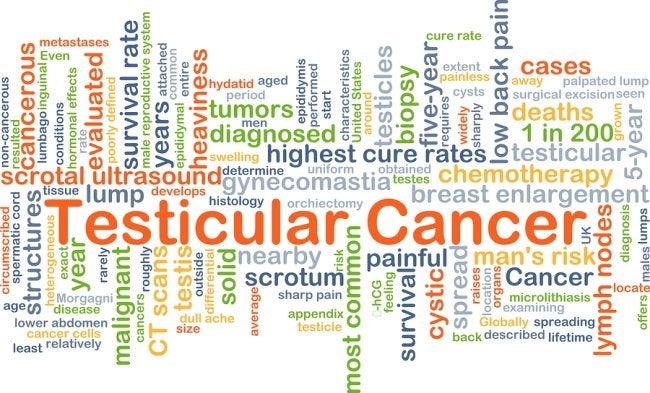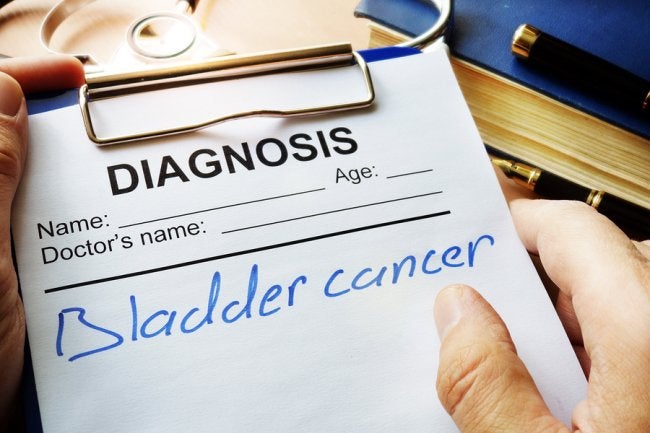-
Get the Answers to Your Questions About Prostatic Intraepithelial Neoplasia

After you undergo a prostate biopsy, the pathologist will study the tissue in a lab, and develop a report of the findings. One of those findings might possibly be prostatic intraepithelial neoplasia (PIN). Your urologist will discuss PIN and any other abnormalities in the pathology report. You should feel free to ask as many questions as you need in order to fully understand your diagnosis and the next steps to take.
Does PIN mean I have prostate cancer?
PIN is not the same thing as cancer. However, it can be a precancerous condition. Ask your urologist whether you have low-grade or high-grade PIN. Low-grade PIN does not appear to increase the risk of prostate cancer. It’s possible that high-grade PIN does raise the risk of cancer . Know that even if you do have high-grade PIN, this doesn’t mean you’ll definitely develop cancer—many men with PIN don’t.
What exactly is PIN?
The broad definition of PIN is simply that some of the cells in the prostate have started to look and function in abnormal ways. These abnormal cells can be found in the lining of the duct that transports semen, and in the lining of miniscule sacs that help produce the semen. PIN involves the abnormal changes of the epithelial cells that line these areas, but they don’t affect the actual lining. This is quite different from prostate cancer, which ruptures the epithelial lining.
What happens next?
Most men with PIN don’t need treatment, but they may have their prostate health monitored during the coming years. Talk to your urologist about whether active surveillance is an appropriate option for you. If so, you might undergo additional prostate biopsies at routine intervals. For the first two years, you might have a biopsy every three or six months. Afterward, you might have a biopsy every year for life. Your recommendations will be customized to accommodate your unique health situation.
Urology Associates, P.C. provides supportive care for men facing prostate disorders in Tennessee. If you’ve been diagnosed with PIN and you’re confused about what this means for your future, schedule a consult with one of our highly trained urologists. Call (855) 901-1338.
-
Getting to Know the WISH Team and Services
The Women’s Institute for Sexual Health (WISH) is available at Urology Associates, P.C. in Nashville. Here, highly trained providers take a collaborative, patient-focused approach to diagnosing and treating sexual health issues. Watch this featured video to meet some of the team members, including the clinical director and medical director.
You’ll also hear about the personalized care you’ll receive. Sexual dysfunction is a sensitive, private matter, and the providers at WISH will do everything possible to ensure your comfort.
To schedule an appointment with the WISH team, you can call them at (615) 250-9265. Our sexual health and urology specialists serving Nashville are committed to delivering high-quality care in a compassionate and confidential manner.
-
Detecting Kidney Cancer

You have two kidneys located deep within your lower back, on either side of your spine. Their job is to remove waste products from the bloodstream, which are then expelled as urine. As with other cancers, the sooner a urologist diagnoses kidney cancer , the better. Early treatment can lead to a more favorable outcome.
Signs and Symptoms of Kidney Cancer
In the absence of symptoms, kidney cancer can be tricky to detect during routine physical exams. Family care doctors can palpate certain areas of the body to check for abnormalities. Women can receive breast exams, for example, to check for possible tumors. Unfortunately, this isn’t possible with the kidneys because they are too far beneath the skin’s surface. Instead, the detection of kidney cancer relies on the patient’s observations and risk factors. Talk to your doctor if you notice some of these possible signs of kidney cancer:
- Bloody urine
- Unexplained low back pain
- Loss of appetite
- Fatigue
- Persistent fever not caused by an infection
- Anemia
- Unintentional weight loss
Screening Tests for Kidney Cancer
Kidney cancer isn’t as common as skin or breast cancer, and there aren’t any routine screenings recommended for the average patient. Some people who are at a high risk of kidney cancer might have routine screening tests. Usually, a kidney cancer screening involves an imaging test, such as a magnetic resonance imaging (MRI) or computed tomography (CT) scan. Ultrasound is another possibility. Some urologists might also recommend periodic urine tests to check for the presence of blood.
Risk Factors of Kidney Cancer
These screening tests aren’t recommended for people at an average risk of kidney cancer. Consider asking your doctor about your risk factors. Some inherited conditions, including von Hippel-Lindau disease, can raise the risk of this cancer . A family history of one of these inherited conditions, or of kidney cancer itself, may be cause for a referral to a genetic counselor.
Kidney cancer is one of the many diseases we treat here at Urology Associates, P.C. Our sophisticated cancer treatment options in Nashville are combined with our personalized, patient-centered approach. If you’ve been referred to a urology specialist, you can get in touch with our friendly office staff at (855) 901-1338.
-
Working with Your Nurse Navigator

When you become a patient at Urology Associates, P.C., you might initially be surprised at the high level of personalized attention you’ll receive. Our urology team goes above and beyond to help men and women along their path toward healing. One of our professionals you may meet is a nurse navigator. Your nurse navigator is assigned to your case specifically to guide you from diagnosis to treatment to follow-up.
Your nurse navigator will make sure you fully understand your diagnosis and treatment options. Your urologist and nurse navigator will carefully coordinate your care, and the nurse navigator will ensure your additional appointments for testing and treatment are made in a timely fashion. Our nurse navigators are available to assist patients with the following conditions: Stress urinary incontinence, fecal incontinence, overactive bladder, benign prostatic hyperplasia (BPH), and prostate cancer.
If you have any questions about working with your nurse navigator or urologist in Tennessee, you can get in touch at (855) 901-1338. Urology Associates, P.C. is proud to be a trusted provider of high-quality medical care for Tennessee residents.
-
How Do Kidney Stones Form?
Kidney stones are a particularly painful urologic condition, although significant medical advancements give patients more treatment options than ever before. You can hear about some of them when you watch this video, which features a board certified urologist at Urology Associates, P.C.
Dr. Charles Eckstein explains that kidney stones form when there is a high concentration of crystals in the urine. Over time, these crystals can develop into stones, which may remain small or grow larger. Patients who are treated for kidney stones can work with their urologists to manage their risk factors, which can help prevent recurrent stones.
Kidney stones are one of the many medical conditions treated at Urology Associates, P.C. Patients with kidney stones who live in Tennessee can call us at (855) 901-1338 to request a prompt appointment with an experienced urologist.
-
Signs of Reduced Estrogen Levels in Women

It’s natural for women to experience a significant decline in estrogen levels later in life. Some women suffer from early estrogen deficiency, well before they’re expected to go through menopause. Although a decline in estrogen is natural, it can be problematic for a woman’s sexual health and overall health. One common symptom is vaginal dryness and painful sexual intercourse. Women may notice that they get urinary tract infections (UTIs) more readily. This is due to the thinning tissues of the urethra.
Other possible indicators of low estrogen levels include atypical fatigue, problems concentrating, and depressive symptoms. Mood swings, hot flashes, headaches, and breast tenderness can also occur. As women approach menopause, their periods become irregular or periodically absent. Headaches or the worsening of pre-existing migraine headaches are also common.
The Women’s Institute for Sexual Health (WISH) at Urology Associates, P.C. offers specialized care and a sensitive, personalized approach for women experiencing sexual health issues in Tennessee. Call (615)250-9265 for an appointment.
-
Possible Culprits for Pain During Sex

Sexual health issues are a topic that many women are hesitant to discuss, even with their doctors. Know that sexual dysfunction is quite common among women, and receiving appropriate treatment is a necessary step toward improving quality of life. In some cases, problems such as painful sexual intercourse could indicate an underlying health problem, such as endometriosis. Women who take the first step by talking to a urology provider are being proactive patients.
Vaginal Atrophy
Vaginal atrophy typically occurs after menopause, when a woman has a drastically reduced amount of estrogen. This hormonal shift causes the vaginal walls to become thinner, less lubricated, and inflamed. In addition to painful sex, women with vaginal atrophy may experience urgent, painful urination, urinary incontinence, genital itching, and frequent urinary tract infections (UTIs).
Vaginismus
Vaginismus is the involuntary contraction or spasm of the vaginal muscles when penetration is attempted. It can occur when attempting sexual penetration or tampon insertion. In some cases, vaginismus is believed to stem from past sexual abuse.
Endometriosis
Normally, the tissue that lines the uterus is shed each month during a woman’s menstrual cycle. In women with endometriosis, uterine tissue grows outside the uterus. This displaced tissue also attempts to shed each month by growing thicker, breaking down, and bleeding. However, the tissue can’t be expelled. Displaced endometrial tissue can cause significant irritation and inflammation, along with the formation of scar tissue, adhesions, and cysts. Women with endometriosis commonly suffer from pain during or after sex, as well as intense pain during menstruation.
Uterine Fibroids
Uterine fibroids are abnormal growths attached to the uterine wall. These are not cancerous, but they can cause medical problems like pain during sex. Fibroids can range widely in size. Some women have just one, while others have many. In some cases, fibroids don’t cause symptoms. Large fibroids can cause painful sex, along with infertility, pelvic pain or pressure, and heavy, prolonged menstruation.
You’ll find sensitive, confidential care for sexual dysfunction in Tennessee at the Women’s Institute for Sexual Health (WISH). WISH, available at Urology Associates, P.C., takes a multidisciplinary approach to coordinate each patient’s care. Call us at (615)250-9265.
-
A Stage-by-Stage Look at Testicular Cancer Treatment Options

A testicular cancer diagnosis is devastating. Patients may regain a sense of control over their lives by studying their treatment options with the help of a urologist. Like many other cancers, testicular cancer is often treated with multiple types of medical interventions. Urologists carefully develop treatment recommendations based on the stage and specific type of testicular cancer, along with the patient’s overall health.
In Situ
In situ cancer, or stage 0 cancer, is diagnosed when the cancer is confined to the testicle and the patient doesn’t have elevated levels of tumor markers. In some cases, in situ testicular cancer is managed with close surveillance. It may only need treatment if it shows signs of growing or spreading. If in situ cancer is treated, the testicle is usually removed or treated with radiation therapy.
Stage I
Stage I treatments depend on whether the cancer is a seminoma or non-seminoma. Stage I seminomas are treated surgically by removing the spermatic cord and testicle , followed by active surveillance, or either chemotherapy or radiation therapy. The treatment for stage I non-seminomas typically involves the surgical removal of the testicle, followed by one or more of these options:
- Active surveillance
- Removal of the lymph nodes at the back of the abdomen
- Chemotherapy
Stage II
If the patient has a stage IIA seminoma, he will likely have surgery to remove the testicle, followed by radiation treatment directed at the retroperitoneal lymph nodes. Otherwise, the urologist will likely recommend three or four cycles of combination chemotherapy. After the surgical removal of the testicle for patients with stage II non-seminomas, the level of tumor markers will determine the subsequent treatment. It may be chemotherapy, or the removal of lymph nodes, which may possibly be followed with chemotherapy.
Stage III
Although stage III testicular tumors have spread beyond the testicles, they are still highly treatable. Patients can expect the surgical removal of the testicle, followed by aggressive chemotherapy. It’s possible for cancer at this stage to spread to the brain, in which case the preferred treatment is usually radiation therapy. Surgery might also be an option.
Men with testicular cancer in Tennessee need answers and treatment options they feel confident about. That’s why so many patients have turned to Urology Associates, P.C. for cutting-edge care delivered by compassionate, understanding healthcare providers. New and current patients can reach us at (855) 901-1338.
-
Cystectomies: What to Know and What to Do

Bladder cancer is one of the less common types of cancer diagnosed in the U.S. It usually affects older adults, and it’s typically diagnosed in its earlier stages. Although cancer treatment is more effective when administered as early as possible, this particular disease does have a higher risk of recurrence than most cancers. If the cancer comes back after an initial treatment, or if it isn’t diagnosed until it’s started to spread, then the urologist may recommend a cystectomy.
About the Surgery
The doctor may perform a partial cystectomy, which removes only part of the bladder , or a radical cystectomy, which removes the entire bladder. In men, this latter option also involves the removal of the prostate and seminal vesicles. In women, the removal of the uterus, cervix, ovaries, fallopian tubes, and some of the vaginal may also need to be removed. If you’ll be undergoing a radical cystectomy, your doctor will explain your options for reconstructive surgery. It will be necessary to have an alternative way of storing urine. There are three options:
- Incontinent diversion: A stoma bag, located outside the body, collects urine for manual emptying.
- Continent diversion: No bag is located on the outside of the body. Urine is drained by inserting a catheter into the new valve on the front of the abdomen.
- Neobladder: The newest method of diverting urine, this involves recreating a new bladder from intestine. Patients may still suffer incontinence, but they can urinate normally.
Steps to Prepare
You’ll be given specific instructions to prepare for the cystectomy, based on your unique health factors. You may be asked to:
- Quit smoking
- Avoid alcohol
- Limit or avoid caffeine
- Make changes to your prescribed and over-the-counter medications
You’ll be placed under general anesthesia for this surgery. To ensure your safety, you’ll need to avoid liquids and food after a certain point—usually midnight the night before the surgery. You should also make arrangements for your recovery. A cystectomy is major surgery, and you can expect to be in the hospital for about five to six days.
At Urology Associates, P.C., you’ll find compassionate care and cutting-edge cancer treatments right here in Tennessee. Our urology team emphasizes the importance of patient education, so you’ll know exactly what to expect and how to prepare for your treatment. Contact our office at (855) 901-1338.
-
Bone Health Care at Our Men’s Health Clinic
The Men’s Health Clinic at Urology Associates, P.C., in Nashville offers a continuum of care to help men live life to the fullest. Watch this video to hear one of our dedicated providers talk about our bone health services. He explains that, although most patients with osteoporosis are female, many men are also affected by this serious problem—especially those who have received cancer treatment for prostate cancer.
It’s possible to have osteoporosis or osteopenia without realizing it. When you arrive at our Men’s Health Clinic, you can learn about any risk factors you may have. These might include a history of smoking, moderate to heavy alcohol use, and certain medical conditions. Urology Associates, P.C., offers rapid diagnostic services and comprehensive treatment of osteoporosis.
You can meet with a urologist in Tennessee by calling Urology Associates, P.C. at (855) 901-1338. In addition to providing effective men’s bone health treatment , our expert team offers cancer treatment and male infertility treatment.
Recent Posts
categories
- Uncategorized
- Bladder Cancer
- Women's Sexual Health
- MonaLisa Touch
- Urology
- Urologist
- Erectile Dysfunction
- Kidney Cancer
- Incontinence
- Prostate
- MonaLisa Touch Laser Treatment
- Kidney Stones
- Urinary Tract Infections
- Event
- Sexual Dysfunction
- Testicular Cancer
- Prostate Cancer
- Urology Surgery Center
- urinary incontinence
- vaginismus
- noncoital pain disorder
- Hypoactive Sexual Desire Disorder
- Infographic
- provenge
- Xofigo
- robotic surgery
- hormone replacement
- diabetes
- renal cell carcinoma
- pelvic pain
- hematuria
- sexual health
- chronic testicular pain
- premature ejaculation
- Men's Health Clinic
- Dr. Melvin Seard
- Interstitial Cystitis
- vasectomy
- overactive bladder
- vaginal atrophy
- nocturia
- bladder infections
- urethral strictures
- Acute Epididymitis
- low sex drive
- circumcision
- pelvic floor dysfunction
- Peyronie's Disease
- prostatitis
- female sexual dysfunction
- varicocele
- difficult urination
- low libido
- PSA levels
- male fertility
- penile prosthesis
- prostatic intraepithelial neoplasia
- male infertility
- estrogen levels
- nurse navigator
- stress urinary incontinence
- vaginal yeast infection
- elevated psa
- painful sex
- adult circumcision
- epididymitis
- OAB
- kidney infection
- penile cancer
- pelvic organ prolapse
- Vasectomy Reversal
- bone health
- cystectomies
- clinical trials
- bloody urine
- Advanced Therapeutic Center
- WISH MedSpa
- neurogenic bladder
- WISH Team
- prostate biopsies
- BPH
- fecal incontinence
- lithotripsy
- osteoporosis
- kidney cysts
